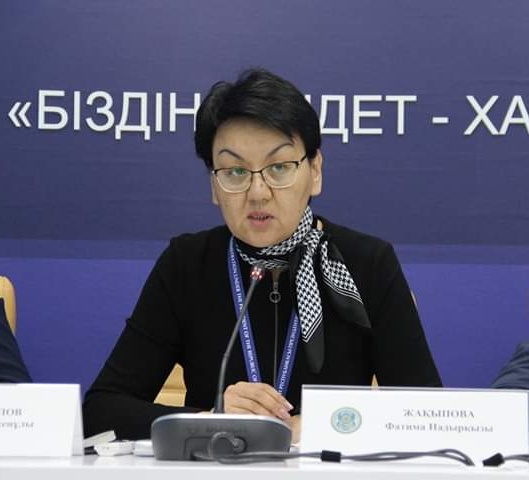ASTANA – Professor Fatima Zhakypova, rector of the Public Administration Academy under the Kazakh President, says her academy is working to adapt the education it offers to a fast-changing world as it also introduces new approaches to civil service training.
“Transformations in education reflect changes in society and show the sustainable trends of its development. Transformations in education are subject to the accelerating course of history as the first of ten global challenges of the 21st century, said [Kazakh President] Nursultan Nazarbayev in the Kazakhstan 2050 strategy. The role of universities, conditions of their sustainable development and degree of their academic and managerial independence are the inevitable issues that require understanding of the process of creating a stable society,” she said in an interview for this story.
The recent amendments and changes to some legislative acts as part of the Step 78 of the 100 Concrete Steps Plan of the Nation provide unique opportunities for the universities. The time has come for real university transformation, for pragmatic and systemic management by professional and cohesive teams of like-minded people.
A career orientation programme is one of the main expectations of today’s education. These expectations are in demand when breakthrough technologies change societal life dramatically and in a short time. A personalised programme is about a whole range of innovations and not just about a change in the names of disciplines in the curriculum or signing of memorandums with partners.
Today’s requirements for civil service competence and the necessity to create a professional and innovative civil state apparatus became the starting point at the academy in developing new approaches to prepare civil servants. The training focuses on current problems in forming an effective state apparatus. The academy’s special status made it possible to comprehensively transform its activities in light of current trends and develop its own approaches to training and retraining civil servants.
“We developed new master’s and doctoral programmes in public policy, public administration, public management, digital public administration, public administration and law, economics, regional development, international relations and anti-corruption policy. They are designed to meet the competences provided in the Common Framework of Competences. Courses are conducted in Kazakh, Russian and English,” said Zhakypova.
Each educational programme is closely related to a certain official position. Their targeted improvement is relevant, because highly qualified personnel are drivers of economic growth.
The academy introduced a system of interactive discussion and training instead of traditional lectures and seminars.
“We do not use the formal assessment of knowledge and prefer the assessment of learning outcomes and competencies based on individual and group presentations, project development, case studies, essays and analytical reports,” she added.
Graduate students develop focus projects on specific topics, which can be used in the activities of state bodies. As a result, the master’s graduation project aims to solve a complex problem in public administration and differs significantly from a thesis.
“We also changed the application process and introduced a new three-step procedure for admission in 2017. At the first stage, applicants are required to provide an international foreign language test (APTIS, IELTS, TOEFL). This, in turn, increased the motivation to learn English by government officials,” she said.
Motivational essays and a personal statement are necessary at the second stage and rather than a test, the final stage includes an interview and case decision. This approach allows identifying individual learning abilities, future career opportunities and further contribution.
“We organise a development day on Fridays. It features lectures on topical issues of state development, seminars on professional growth, intellectual games and even sports events. Also, we hold the Kyzmet-talk, a talk show in a TED format, dedicated to the problems of statehood and management. We invite public figures and scientists to deliver lectures. We noticed that our team became inspired to create and implement new initiatives,” she said.
The Centre for Development of Project Management in Public Administration is designed to become a methodological and educational project management hub. The academy will provide support in introducing project management in state bodies.
Last year, the institution developed the Digital Academy project to promote technological and managerial solutions and online training using digital educational resources. The project, now part of the Digital Kazakhstan state programme, will be the basis for transforming the academy into an IT competency centre for civil servants and will contribute to successfully implementing priorities for digitising public service aimed at improving the welfare of society.


